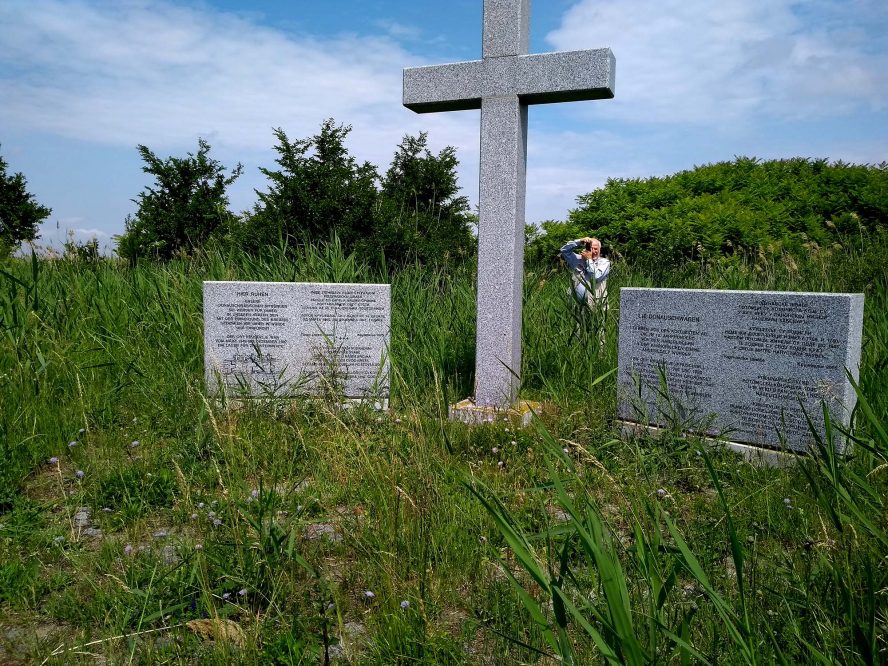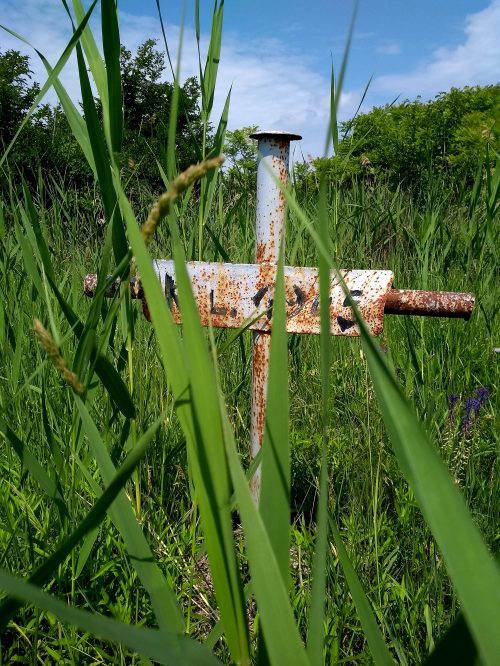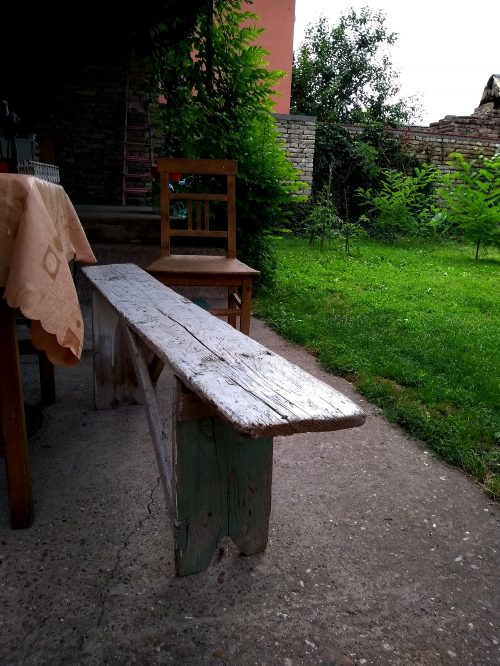Kerneireise – that’s what it says on a leaflet that’s been lying around my desktop for a while, first Kerneireise 2017, then Kerneireise 2018. It gives the dates and places to be visited; a trip from Germany to Kernei, pronounced Kernai, better known in these parts as what was once Krnjaja and is now Kljajićevo, a village near Sombor.
A group was supposed to come to Kljajićevo already last year, but not enough people signed up. They are people connected to HOG Kernei, an association of people who used to live in Kljajićevo and their descendants. They are descended from the Danube Germans, or as they refer to themselves, the Danube Swabians who used to live in what was once Kernei and is today Kljajićevo.
This was once a majority German town (96%). At the end of the war, they had escaped before the progressing Red Army and People’s Liberation Army of Yugoslavia, some because of their wrongdoings and others simply because they were afraid of what might happen, and as it turned out, their fears were confirmed. Afterwards, some were deported to the USSR, one part of the village was turned into a ‘small’ civilian camp, and some of them ended up in Gakovo and Kruševlje. The great majority, if not all the Danube Swabians were deprived of their property, including here in Kljajićevo. In the years after the war, there were fewer and fewer Germans until they had all left, if that is even the right word to describe what happened. These days, according to the 2011 census, out of a population of 5045, only nine identify as Germans.
…
Here is how I experienced this visit by the Danube Swabians, here is what happened, in brief, and what I thought about as it was happening.

A group of Danube Swabians with origins in Kljajićevo set off on Wednesday, 23 May from Stuttgart on their way to Sombor and arrived on Thursday. I wanted to meet them, to hear their personal stories about what had happened to them and their families, why they were coming here now, how they left, what made them come visit now, what their impressions were, their emotions, etc. I wanted to go with them to Gakovo and Kruševlje, some of the largest camps in Vojvodina for the Danube Swabians after the Second World War, and together with them honour the victims. Those were my expectations, but what I did not expect were the many kind, warm people and the torrent of emotions that was sometimes difficult to keep up with – from anticipation, curiosity and excitement to sorrow, compassion and incredulity, with a common feeling of shared laughter and the pain, that of others and my own.
Another thing I was not expecting last year when I got in touch with Helmut Schmidt, the organiser of the trip who was kind enough to include me in the programme and whom I was arranging to meet, well, I did not expect my cousin. And not some distant relation I don’t know how many times removed, but, as it turned out, my father and her mother were brother and sister. We had never met before. I did not even know she existed. All this turned my whirlwind of emotions into a real centrifuge at 1000 rpm.
…

The tour planned as part of the trip included visiting the mass graves in Gakovo and Kruševlje. This was also my first visit to Kruševlje, not to what was left of the village, which adds up to literally no more than three houses, the rest having been converted into fields. It was my first visit to the mass grave and the memorial there. From the distance, as we approach, we see a grove, and as we get closer, going on foot, a monument comes into view, a large cross. Surrounded by tombstones. Died or killed in 1945. I found out that some of my relatives were also at that camp. A communal prayer, I take part, it’s important – I can’t quite say why it’s important, but it is. We talk together, it feels odd to me to be speaking German, and we are silent together. A woman asks us to pay our respects to the victims together–her, Anton Beck and I, as representatives of those who live here or those who remained or… as some sort of ritual, a prayer, a gesture of reconciliation. I am touched, sad, emotional, curious, alert, on the one hand, but on the other, I’m trying to figure out what it is that I am supposed to represent. I talk with the people. They are not just from Germany, they also come from France and the US, whole families have come for the trip. One young woman came with her father-in-law from Chicago. She had heard many stories from him, but could I explain to her what exactly happened in Kruševlje and Gakovo.
I had visited Gakovo a few times, but both then and now, as we pass through the village I catch myself thinking, is it possible that in these few houses and streets more than 17,000 people were interned, up to 22,000 according to some sources. I don’t know why I chose this neutral term – interned. In Gakovo, I am most anxious to speak with my cousin. But how do you speak with someone who is a close relation, but you are separated by everything that happened to the Danube Swabians, and by your own family narrative. Who are you, what are you, what are you like, is there anything that connects us apart from ‘just’ a family relation. I like her, I observe her to see if there is anything of my father I can recognise in her. We talk, trying to overcome the language barrier, doing our best. It feels strange. For the first time, I understand in my heart and my head that I am also part of the story about the Danube Swabians.
Kernei/Kljajićevo. Finally, we arrive, though late, and we stay for a long time. They welcome us at the centre by the church that had changed its ‘identity’ a few times, but luckily remained standing. There is also the warm welcome at the Culture Centre, with representatives of the Kljajićevo Local Community, but also of Sombor, and I think about how important it is that the community is involved in welcoming this group of people. A warm welcome, bread, salt and brandy, boys and girls in folk costume, and later a boy reads a text in German. They really put in an effort, and I think about how important that is. Everyone claps. People are excited. The whole day has been emotional for them. For me, too. Later, they go on to Apatin, and I skip that part, I return to Sombor, I cannot do more, which is perhaps best because I am completely exhausted, the centrifuge is running at I don’t know how many rpm, I cannot process any more thoughts.

The next day we go from Sombor to Kljajićevo again. A mass will be held in German at the church. I look at the church building, hoping the plaster does not fall off and hit someone on the head. That’s the state it’s in. My cousin and I are not interested in the mass, we have more important things to do – we have to find the house where our parents used to live.
I’m turning the map around, trying to find the house, I got confused somewhere, what is wrong with me, I think. “Have you ever seen the house?” my cousin asks. “No, never,” I say. She shakes her head. We find the house on the map, but realise that the street number could be somewhere up ahead. She has a photo of it and we recognise it, this is it. We go through the gate into the ajnfort and I call, “Hello, anybody there?” A woman comes out and I explain, she’s confused, but she knows what I’m talking about. She says she’d heard about it on the news, should have known someone would be coming. She quickly adds, “But, you know, we’re not colonists. We came here only later. I think, or I say, “Even if you were, that’s OK.” As we carry on talking, the conversation flows easier. She is attentive and kind. I interpret for my cousin. She says, this bench, the chairs and table in the yard, and she points at them, they’re from that time, they were theirs, she says, meaning our parents’. I am on the edge of tears. And again I think, What is wrong with me, this has nothing to do with me? She asks us, especially my cousin, “We have been keeping some things, a picture frame, it must be yours, do you want it?” I thank her for taking care of the things, I understand how important it is to me suddenly. And she responds, breaking into tears, “I know what it’s like to lose everything, when you have to leave your home. We are from Plitvice,” she says, “We’ve been through the same sort of thing.” And I think again, can a centrifuge go faster than 1000 rpm?
…
What was valuable to me? To spend at least some time with these people, descended from Kljajićevo, the Danube Swabians and their families. To step into their shoes for a moment. To be there, for them, and not as a ‘representative’ of someone from here. To exchange thoughts and feelings with those people. To meet my cousin and talk with her. I cherish the knowledge about how important it is to remember and to talk about these things, though it’s nothing new, and how important it is for the old and new villagers to meet. To talk with the local government representatives in Kljajićevo who organised all this. How important it is to ask those people too, the so-called colonists and their descendants, about how they are doing, what happened to them when they arrived here. How difficult it is sometimes for them to say, yes, we were given this house.
I am grateful to the whole group that came and all the people I talked to. To Helmut Schmidt who was lovely to talk to and arrange things, to my cousin who got in touch with me and together we went to visit our parents’ house, to Anton Beck for his support, to Rade and Milan Ćuić and Davor Šmarac from Kljajićevo for their organisation, and to the hosts who live in that house. I am still sorting through my impressions, there is still much to process.
Another visit to Vojvodina in the works – perhaps there are more, but I know about this one. In October this year, an association of Danube Swabians – once from Apatin – is coming to visit. This will also be an opportunity to open the exhibition “On the Trail of the Danube Swabians in Vojvodina” together in Apatin and to talk to each other. The Danube Swabians of Apatin were among the first, if not the first to be taken to the Gakovo camp. Many of them never made it out.
